Business Questions under waypublished at 11:38 GMT 22 February 2024
Business Questions are starting the House of Commons, but without Speaker Lindsay Hoyle mediating the floor.
Stick with us as we bring you key lines from the session.
Rishi Sunak calls Sir Lindsay Hoyle's decision to break with convention on a Gaza ceasefire vote "very concerning"
The PM says "we should never let extremists intimidate us" into changing how Parliament works, after Hoyle allowed a vote on a Labour amendment to an SNP proposal
It comes after the SNP's Westminster leader tells Hoyle his party has no confidence in him as Commons Speaker after yesterday's debate chaos
More than 60 MPs now say they have no confidence in Hoyle, who has apologised twice for making the "wrong decision"
Meanwhile, Labour leader Sir Keir Starmer has denied threatening Hoyle, saying he “simply urged” the Speaker to ensure there was the “broadest possible debate”
On Wednesday, MPs approved a Labour motion calling for an "immediate humanitarian ceasefire" following hours of debate which saw SNP and Conservative MPs walk out of the Commons
You can watch our coverage live at the top of this page by clicking the play button
Edited by Alex Therrien
Business Questions are starting the House of Commons, but without Speaker Lindsay Hoyle mediating the floor.
Stick with us as we bring you key lines from the session.
Last night the Speaker said one of his main reasons for allowing the Labour amendment to be voted on was because of concerns for MPs' safety.
This issue was brought up again this morning in the House of Commons during a session where MPs could put questions to the government.
Barry Sheerman, Labour MP for Huddersfield, spoke of his experience of receiving a death threat and the impacts it has had on his life.
Earlier today Labour MP Stella Creasy told the BBC she had faced "threats and intimidation" and MPs needed to be able to debate in parliament without fear.
"Where does this end if we're saying that MPs and their families and their homes are fair game?" she said.
In November Labour MP Jo Stevens's Cardiff office was vandalised following a vote on a ceasefire in Gaza. Conservative MP Mike Freer says he is standing down at the next election over safety fears.
In 2016 Jo Cox, Labour MP for Batley and Spen, was murdered in broad daylight and five years later Sir David Amess, Conservative MP for Southend West, was stabbed more than 20 times in his office.
The heads of some of the UK's largest charities are calling out the country's politicians for "political theatrics".
Oxfam’s Head of Policy and Advocacy, Katy Chakrabortty, accused MPs of dithering in "playground politics" and added that: “The people of Gaza can’t wait for our politicians to stop squabbling.”
The CEO of ActionAid UK, Halima Begum, says that the international charity is "extremely disappointed to see the utter paralysis in parliament this evening".
Quote Message"A great disservice has been done to the British people, who expected their political parties and elected representatives to conduct a meaningful debate concerning an issue on which depends the lives of over a hundred Israeli hostages, and hundreds of thousands of Gazans suffering one of the most acute humanitarian crises we have seen in recent times."
Halima Begum
Those attitudes were shared by Helen McEachern, head of CARE International UK, who says that the charity was "dismayed by the political theatrics” that ultimately “do nothing to assist the people of Gaza".
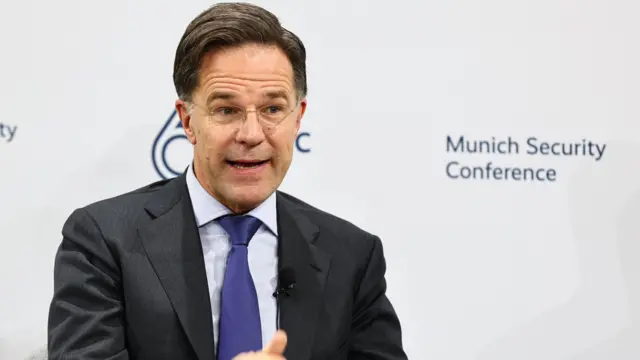 Image source, EPA
Image source, EPAThe UK is backing outgoing Dutch PM Mark Rutte to succeed Jens Stoltenberg as the next secretary general of the Nato military alliance, the Foreign Office says.
Stoltenberg assumed the role in October 2014 and is due to step down on 1 October 2024.
Rutte is due to be replaced as Dutch PM when a new government is formed following the country's election last November.

 Harry Farley
Harry Farley
Political correspondent
The SNP deny they were playing party politics with such a sensitive issue like yesterday's ceasefire vote. When I spoke to Stephen Flynn, the SNP’s Westminster leader, last night he said they had written the motion to be as simple as possible and had long called for an immediate ceasefire in Gaza.
But Labour sources describe the SNP motion as “one-sided”. These sources point to the fact it did not condemn Hamas, did not recognise the need for Hamas to stop the violence as well as Israel and it included reference to the “collective punishment” of Palestinian people.
That is why Labour argued MPs needed a chance to vote for their motion, which called for an “immediate humanitarian ceasefire” but did not make reference to “collective punishment”. It also condemned Hamas, saying “Israel cannot be expected to cease fighting if Hamas continues with violence”.
If Labour’s amendment had not been selected, like it was, MPs would have just had a choice between the SNPs call for an “immediate ceasefire” and the government’s language of a “humanitarian pause” - but not yet a ceasefire.
Given that choice, many Labour MPs would've been tempted to rebel against their own party and back the SNP.
That is why some Conservative and SNP MPs are accusing the Speaker of allowing Labour to avoid a rebellion.
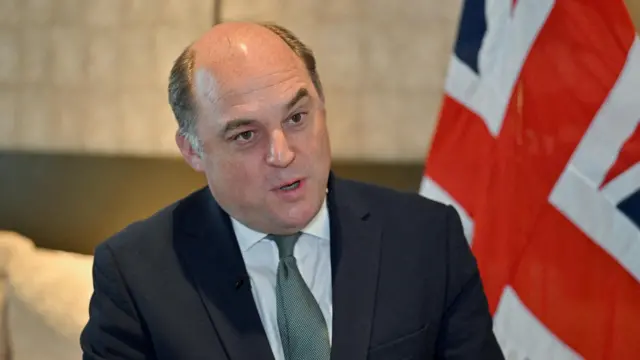 Image source, Reuters
Image source, ReutersFormer defence secretary Ben Wallace says Sir Lindsay Hoyle has his "full support" as nearly 60 MPs have now signed a motion of no confidence in the Commons Speaker.
"I have served under three speakers. Lindsay Hoyle is head and shoulders above the rest. He is fair, kind and a protector of back benchers. He is not a bully nor a grandstander nor pompous," Wallace, a Tory MP, writes in a post on X, external.
He says the real question is why Labour leader Sir Keir Starmer "seems to think Commons rules should not be followed", asking: "Is it one rule for Starmer and one for the rest of us?"
"Labour always knew it was an SNP opposition day so why did Labour seek to override standing orders?" he adds.
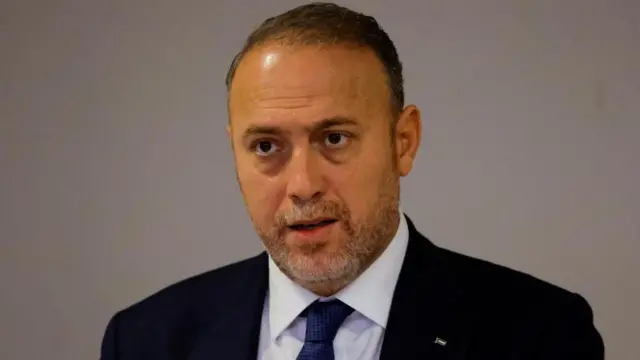 Image source, Reuters
Image source, ReutersHusam Zomlot said yesterday's scenes in the Commons were "disgraceful"
"Not a good day for humanity" is how the Palestinian envoy to the UK is describing events in the Commons yesterday.
"To see this chaos in the House of Commons, it's really, really British politics at its lowest," Husam Zomlot told Channel 4 News last night.
He says it was "disgraceful and shameful" that MPs were debating calling for a ceasefire after more than 29,000 people had been killed in Gaza, according to the Hamas-run health ministry there.
"MPs have tonight have shown everybody they are defending and protecting their careers as opposed to defending and protecting children."
Israel began its military campaign in Gaza after Hamas attacked southern Israel on 7 October, killing about 1,200 people and taking about 240 people hostage.

 Harry Farley
Harry Farley
Political correspondent
As of writing this, there are currently 53 MPs signed up to a motion of no confidence in the Speaker, Sir Lindsay Hoyle.
That's up from around 30 since just a few hours ago.
As a reminder, the Speaker must remain politically impartial and needs to command the confidence of the House of Commons.
So how much jeopardy is Hoyle in?
The Leader of the House of Commons, Penny Mordaunt, will face questions from MPs in the House of Commons today and no doubt some of those who signed up to the motion of no confidence will ask for there to be a debate on the Speaker's future.
As my colleague Peter Barnes pointed out earlier, there’s no formal mechanism for MPs to oust the Speaker.
However, there is a precedent for a speaker being pressured into resignation.
Maria Caulfield, the Conservative health minister, was certainly adding to that pressure this morning when she alleged that he had taken “no consideration of what would happen to Conservative MPs" by allowing Labour’s motion.
The question is whether there will be enough pressure on Hoyle so that he feels he must quit.
Last night, Labour's amendment for an immediate humanitarian ceasefire in Gaza went through to loud shouts of "aye" without a formal vote, after the government said it would not take part.
It is important to note that despite the ferocity of the debate yesterday, the government does not have to adopt Labour's position as the vote is not binding.
Conservative Leader of the House Penny Mordaunt said in the chamber yesterday that UK policy remained unchanged.
And above all else, it changes nothing at all on the ground in Gaza.
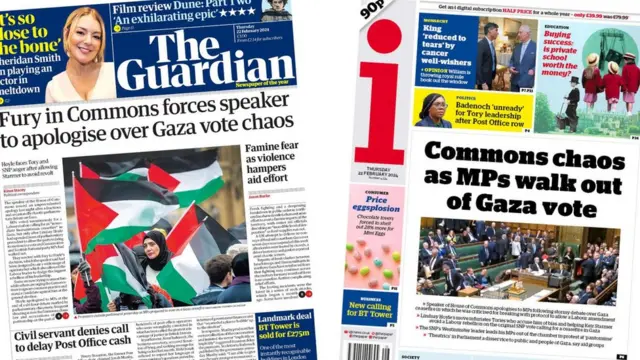
The chaotic scenes during yesterday's House of Commons debate and vote on calls for a ceasefire in the Israel-Gaza war are dominating the front pages of most of today's papers.
"Fury in Commons", "Commons chaos", "Vote stitch-up" and "Speaker on brink" are among the toplines chosen to describe yesterday's events this morning.
Those reports share the information we have been bringing you here, most importantly that Sir Lindsay Hoyle may be fighting to keep his job and could have lost the confidence of the House.
Peter Barnes
BBC political analyst
As calls for a resignation mount, it's worth considering whether it's even possible for a Speaker to get sacked.
There’s not a formal mechanism in place for MPs to oust the Speaker from their role.
Erskine May, the "bible" of parliamentary procedure, explains that a Speaker is elected, or re-elected, by MPs after every general election.
And “thus elected and approved, continues in that office during the whole Parliament, unless in the meantime they resign or are removed by death”.
However, there is a precedent for a Speaker being pressured into a resignation.
Michael Martin, who served in the role from 2000 to 2009, stepped down after criticism of his handling of the MPs’ expenses scandal. He said his reason for standing down was to maintain the unity of the House of Commons.
The number MPs who have signed a motion of no confidence in Commons Speaker Lindsay Hoyle has now risen to 50.
Previously, 33 MPs had signed the motion, proposed by Tory MP William Wragg.
You can view the full list of names here, external.
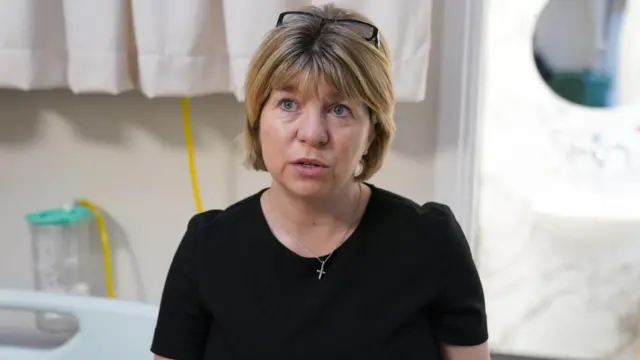 Image source, PA
Image source, PAConservative MP Maria Caulfield told the BBC that the Speaker had come 'under pressure' from Labour
Maria Caulfield, the government's minister for women's health, has refused to back Hoyle as Speaker, saying she would "struggle to support" him for the way he handled yesterday's vote.
Caulfield told Sky she thinks his position is now "difficult".
Earlier she told the BBC her she felt the Speaker's decision yesterday to break with convention and allow the Labour amendment was the result of "undue pressure" from Labour leader Sir Keir Starmer.
As a reminder, the original SNP motion called for an "immediate ceasefire" and said Israel's war amounted to "collective punishment" of Palestinians, a position Labour did not support. Meanwhile the government amendment called for a "humanitarian pause". Hoyle then allowed a Labour amendment calling for an "immediate humanitarian ceasefire".
Caulfield said the Labour amendment meant "we would be the only party not supporting the SNP motion so all the fire would come on Conservative MPs".
"I just felt that he was putting party politics above the impartiality of the Speaker, he took the threats to Labour MPs seriously but took no consideration of what would happen to Conservative MPs," Caulfield added.
Earlier this month, a 46-year-old man admitted to calling the north London office of Conservative MP Mike Freer and saying: "I'm coming for you". The Tory MP has since said that he plans to stand down at the next election after earlier death threats and an arson attack on his constituency office.
Nick Watt
Political editor, BBC Newsnight
I have had conversation with MPs, senior Labour MPs who have great fears for their security. These are being taken seriously by the authorities and in some cases there is police protection.
What we are talking about is Labour MPs who voted for the Labour amendment back in November which did not talk about an immediate ceasefire.
They were hounded on social media, and we're talking about protests outside homes and that was very much in the mind of Keir Starmer and indeed very much in the mind of the Speaker when he made that statement yesterday.
Essentially what he was worried about is that, had he not allowed the Labour amendment yesterday which did call for an immediate humanitarian ceasefire, those Labour MPs would have only had the choice of voting for the SNP motion - which they couldn't do because it talked about how Israel was guilty of collective punishment. Or they could vote for the government motion and that talked about humanitarian pauses.
The Speaker felt that you should give those MPs the ability to vote for an immediate humanitarian ceasefire in the way they felt comfortable with.
A member of the shadow cabinet sent me a lengthy heartfelt text saying: "Hounded on social media? Nick it's so much worse than that. I'm really fearful."
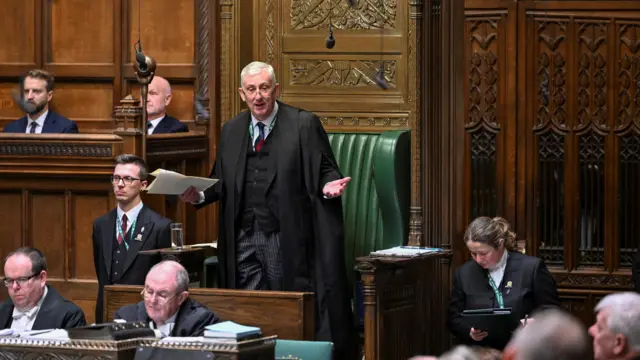 Image source, UK Parliament
Image source, UK ParliamentThere’s a lot of talk about Sir Lindsay Hoyle this morning. But who is he?
Well, he’s best known as the Speaker of the House of Commons – an office held always by an MP elected to the role by other MPs.
The job requires him to be an impartial chair of debates in the Commons, ensure order and call MPs to speak.
Hoyle, the MP for Chorley in Lancashire, was elected as Speaker on 4 November 2019, following the resignation of Speaker John Bercow.
Yesterday, he sparked fury among SNP and Tory MPs for breaking with convention and choosing a Labour amendment for debate. Normally on what is known as an opposition day, the nominated opposition party - in this case the SNP - proposes a motion and only a government amendment is also considered.
The anger culminated in a motion, proposed by Tory MP William Wragg, of no confidence in Hoyle’s Speakership. So far, 33 have signed it.
The stir in the Commons yesterday came down to small but essential differences in how MPs and parties were calling for an end to fighting in Gaza.
Let’s go through them one by one:
Scottish National Party
Labour
Government
In extraordinary scenes yesterday, SNP MPs and some Tories walked out of the chamber over the Speaker's handling of the vote - and 33 MPs have now called for him to resign.
This came just before MPs were due to vote on calls for a ceasefire.
As we've been reporting, a Labour amendment calling for an immediate humanitarian ceasefire was ultimately nodded through.
Labour leader Sir Keir Starmer condemned the walkout, saying it was clear that "only Labour that will put country over party and silly political games in order to deliver."
Charities dealing directly with the effects of the war in Gaza also hit out at the "theatrics" in Parliament.
Pat McFadden describes yesterday's row in the Commons as "unseemly".
McFadden told Radio 4's Today programme: "It's become about Parliament, it's become about process rather than the need for humanitarian action to protect people."
McFadden said there needed to be a consensus in the House on supporting a ceasefire in Gaza.
"We've all spoken together, united about the need to support our friends in Ukraine against the barbarity of Putin and his regime. We should have been doing the same on Gaza."
He said Parliament needed "to be a voice for those in the Gaza Strip" and demanded "increasing resolve to make sure that we can make a difference".
"We've got to find a way through this and remember it's got to be about Gaza", he added.
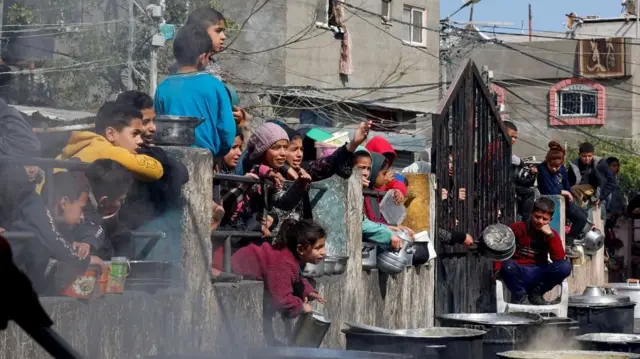 Image source, Reuters
Image source, ReutersPalestinian children wait to receive food cooked by a charity kitchen in Rafah
Yesterday’s vote in the House of Commons came as Israel threatens to extend its ground operation into the city of Rafah, defying international opposition.
More than a million displaced Palestinians, who represent about half of Gaza's population, are sheltering in the southern Gaza city, having fled fighting in the north earlier on in the conflict.
There were reports of more Israeli air strikes on Rafah on Thursday.
The White House coordinator for the Middle East, Brett McGurk, is due to arrive in Israel today, as the US continues efforts to secure a truce and hostage deal.
Israeli police say one person was killed and five others injured after three Palestinians opened fire at motorists near an Israeli checkpoint in the occupied West Bank near Jerusalem.
On Tuesday, the US vetoed an Algerian-proposed resolution at the UN demanding an immediate ceasefire in Gaza.
In its own draft resolution, urging a temporary ceasefire, the US warned Israel not to invade Rafah.
Israel launched its operations in Gaza following an attack by Hamas gunmen on southern Israel on 7 October, during which about 1,200 people were killed and more than 240 others taken hostage.
The Israeli military campaign has killed 29,000 people in the Palestinian territory, according to the Hamas-run health ministry there.
The former British ambassador to Lebanon has told the BBC that yesterday's walkout was "not exactly Parliament's finest hour."
Tom Fletcher, who served as ambassador from 2011-2015 said there was too much focus on the parliamentary debate "as though it matters more than stopping the violence against civilians".
Speaking on BBC Radio 4's Today programme, Fletcher said he had been speaking to his contacts in the region who have been following what's been happening in the UK.
"I met with the Lebanese prime minister earlier this week and clearly the Lebanese people do not want that conflict," he said.
The Iran-backed Lebanese group Hezbollah has been trading fire with Israel since war broke out, with civilians killed on both sides and thousands having to leave their homes.
Fletcher added, "I think people are right to be worried about the dangers of escalation that could draw in more countries in the region."
He urged Parliament to "get back to the big issue of getting aid in" to Gaza and "to the faint hope of a two-state solution" to the Israeli-Palestinian conflict.